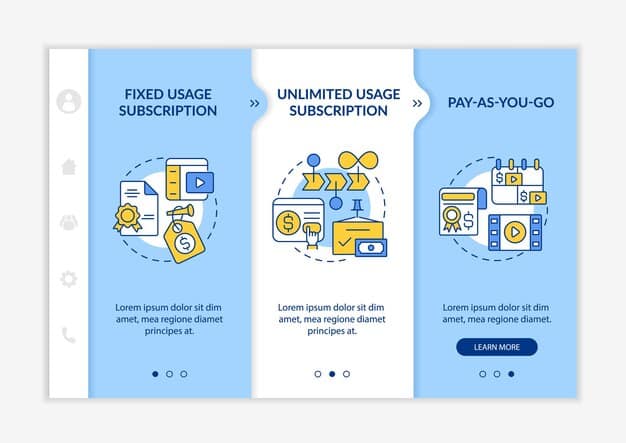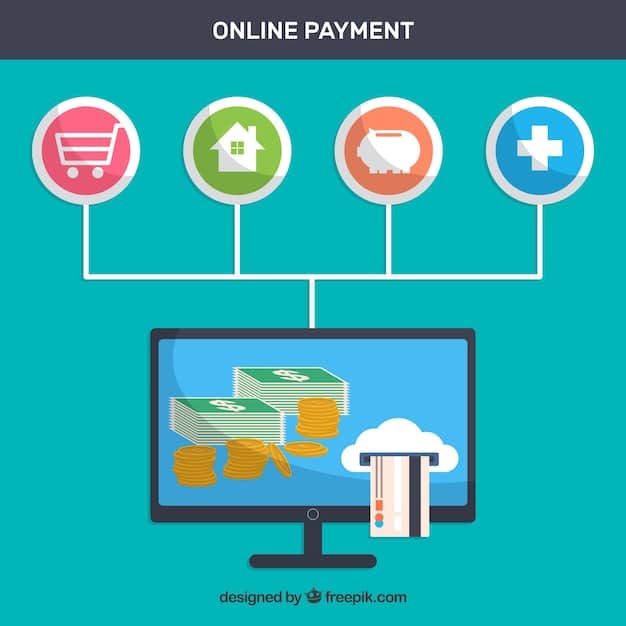Maximize Profits: US Payment Gateways Comparison for Online Businesses in 2025

Maximize your profits in 2025 by selecting the optimal US payment gateway for your online business, considering factors like transaction fees, security, and integration capabilities.
Choosing the right payment gateway is crucial for any online business. As we approach 2025, understanding the landscape of US payment gateways and how they impact your bottom line becomes even more critical. Let’s dive into a comparison to maximize your profits: a comparison of US payment gateways for online businesses in 2025.
Understanding the Payment Gateway Landscape in the US
The world of payment gateways can seem complex, but grasping the basics is essential for making informed decisions. This section provides an overview of the key players and factors to consider.
Payment gateways act as intermediaries between your online store and the customer’s bank. They securely transmit payment information, ensuring a smooth transaction process.
Key Players in the US Payment Gateway Market
Several major players dominate the US market, each with its own strengths and weaknesses.
- Stripe: Known for its developer-friendly API and extensive customization options.
- PayPal: A ubiquitous option offering both online and in-person payment solutions, with high brand recognition.
- Square: Popular among smaller businesses, offering a simple setup and integration with its POS system.
- Authorize.net: A long-standing gateway providing reliable service and a wide range of features.
Ultimately, understanding the specific strengths of each payment gateway helps you choose the option that will lead you to maximize your profits.
Transaction Fees: A Deep Dive
Transaction fees are a significant factor affecting your profitability. Understanding the different fee structures and how they apply to your business is crucial.
Payment gateways typically charge a percentage of each transaction, plus a fixed fee. These fees can vary significantly between providers and depend on your business volume and risk profile.

Decoding the Fee Structures
Different payment gateways employ different fee models. Here’s a breakdown of what to look for:
- Percentage fee: A percentage of the total transaction amount (e.g., 2.9%).
- Fixed fee: A flat fee charged per transaction (e.g., $0.30).
- Monthly fee: A recurring monthly charge for using the gateway.
- Setup fee: A one-time fee to set up your account.
Choosing the most cost-effective option for your business depends on the size and volume of your transactions.
Security Measures and Compliance
Security is paramount when handling online transactions. Ensuring your chosen payment gateway provides robust security measures is non-negotiable.
Payment gateways must comply with industry standards such as PCI DSS (Payment Card Industry Data Security Standard) to protect sensitive cardholder data.
Essential Security Features
- Tokenization: Replacing sensitive card data with non-sensitive tokens to prevent data breaches.
- Encryption: Encrypting data during transmission to protect it from interception.
- Fraud detection: Identifying and preventing fraudulent transactions.
Prioritizing security features protects your business and customers from potential fraud and data breaches.
Integration Capabilities and Ease of Use
A seamless integration with your existing e-commerce platform is crucial for a smooth operation. Consider the ease of use and integration capabilities when making your selection.
Payment gateways should offer easy-to-use APIs and plugins for popular e-commerce platforms like Shopify, WooCommerce, and Magento.

Evaluating Integration Options
Consider these integration aspects:
- API documentation: Clear and comprehensive documentation for developers.
- Plugin availability: Pre-built plugins for popular e-commerce platforms.
- Customization options: Flexibility to customize the checkout experience.
A well-integrated payment gateway streamlines the checkout process and enhances the customer experience.
Customer Support and Reliability
Reliable customer support is essential for resolving issues quickly and efficiently. Look for providers with responsive and knowledgeable support teams.
Payment gateways should offer multiple support channels, including phone, email, and live chat. Response times and quality of support are critical factors to consider.
Assessing Support Channels
Evaluate the following support aspects:
- Availability: 24/7 support for urgent issues.
- Response time: Quick response times to minimize downtime.
- Knowledge base: Comprehensive documentation and FAQs.
Reliable customer support ensures you can address issues promptly and maintain a smooth payment processing operation.
Future Trends in Payment Gateways for 2025
The payment gateway landscape is constantly evolving. Staying abreast of future trends helps you future-proof your business and maximize your profits.
Expect to see increased adoption of mobile payments, cryptocurrency integration, and enhanced fraud prevention measures.
Anticipating Future Developments
- Mobile payments: Expanding support for mobile wallets like Apple Pay and Google Pay.
- Cryptocurrency: Integration with cryptocurrencies for broader payment options.
- AI-powered fraud detection: Advanced fraud detection algorithms based on artificial intelligence.
Being prepared for these trends positions your business for continued success in the evolving payments landscape.
| Key Aspect | Brief Description |
|---|---|
| 💰 Transaction Fees | Compare percentage and fixed fees to minimize costs. |
| 🔒 Security Measures | Ensure PCI DSS compliance, tokenization, and fraud detection. |
| 💻 Integration | Choose a gateway that integrates seamlessly with your platform. |
| 🤝 Customer Support | Opt for gateways with responsive and reliable customer service. |
Frequently Asked Questions
What are the most common transaction fees for US payment gateways?▼
The most common transaction fees involve a percentage (2-3%) and a fixed fee (around $0.30) per transaction, but can vary.
How can I ensure my payment gateway is secure?▼
Confirm PCI DSS compliance, use tokenization, encryption, and implement fraud detection tools for comprehensive security.
Which payment gateways easily integrate with Shopify?▼
Stripe, PayPal, and Square offer seamless pre-built plugins for efficient Shopify integration.
Does customer support matter when choosing a payment gateway?▼





